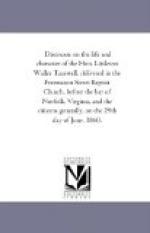Tazewell spent his old age as Washington, Jefferson, Jay, Madison, and John Adams spent theirs, but with far greater success than them all, in attending mainly to his private affairs, and in those offices which a splendid reputation draws in its train. He was exact in all things. If you inquired what any one of his estates cost him, he would take down a bound foolscap volume, turn at once to the farm in question, read off the price, the amount of its outfit, the number of hands engaged in working it, and, if you pleased to listen, the cost of every improvement he put upon it, the division of its fields, and their products for every year since he owned it, and the money value of those products in market. He knew what fields on his various estates were in cultivation; and in the spring—for all his crops were annual—he made an estimate of the probable product of each field, and entered it in the book; and in the fall, the actual result, which sometimes fell a little short, sometimes slightly exceeded, and sometimes was identical with the estimate of the spring. This process was something more than a pastime; it kept him intimately acquainted with his different estates, and was a severe check on the management of the overseers. He loved the game of chess, was always ready to engage in it, and often played alone. He read chess periodicals, kept an account of his own moves, and, deducting the employment which it gave him when his eyes were dimmed with reading, devoted to that fascinating but frivolous game more time and attention than it deserved.
To form a just opinion of Mr. Tazewell in private life, he must have been seen again and again. In matters of business he was scrupulously exact himself, and would be satisfied with nothing less from others. In this way he may have given offence, and subjected himself to the charge of closeness; but it was partly the result of his legal habits, and partly of the rigid system which pervaded his financial schemes. That the love of accumulation was no element in the case was shown, apart from the great lesson which his life will read to all, by his large deposits in the vaults of the banks, by which, in the course of thirty years, he must have lost thousands; and by the proverbial moderation of his fees.[13] Such was his care and judgment that I do not think he ever made a bad investment, or lost a sum of money.
Withal I am inclined to wish that he had devoted the first ten years of his retirement to a work on the Laws of Nations, and especially of the Law of Admiralty, which was the favorite science of his venerable grandfather, and of which, during the preceding twenty years, he had obtained so perfect a mastery. He loved the Common Law, revelled in its subtleties, expounded with a richness and a grace ever to be remembered the leading statutes by which the wisdom of a thousand years had controlled or modified it, and gloried in it as the living remembrancer of the liberties of




